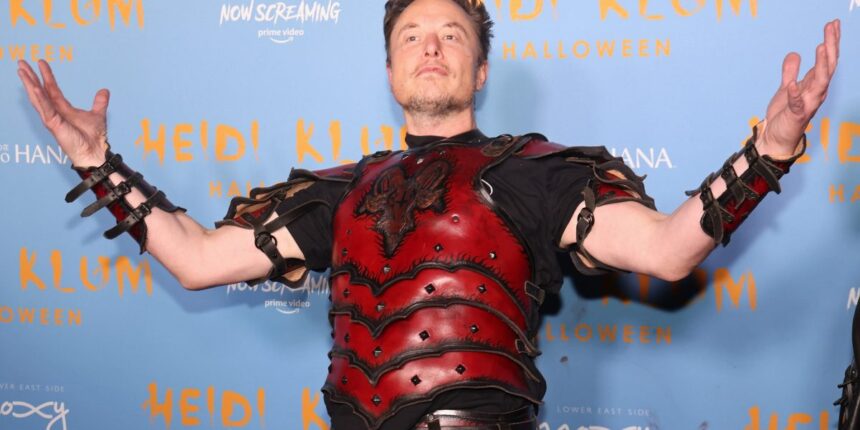
Elon Musk had just finished playing a video game with Grimes when he made his offer to buy Twitter in April 2022. He and the musician, with whom he has three children, had stayed up until 5 a.m. playing Elden Ring, a new war and empire-building video game that was released a couple months prior. Right after they wrapped up, he pulled the trigger on his hostile bid to buy the social media company, tweeting at 7:23 a.m., “I made an offer,” with a link to a SEC filing disclosing the proposal.
Understanding Musk’s obsessions with video games is a key to understanding his “intensity, focus, competitiveness, die-hard attitudes, and love of strategy,” according to Walter Isaacson’s biography, Elon Musk, which was released on Tuesday. And it’s no wonder: The billionaire lives his life as though he’s constantly playing a video game. From making seemingly brash business decisions, like the Twitter deal, to how he designs self-driving cars and rocket ships with little regard for safety, Musk constantly takes on huge risks with little concern for the consequences.
Musk’s favorite video game is a multi-player strategy game called The Battle of Polytopia. Within the brightly-colored, cartoonish-looking game, players compete to develop technologies, control resources, and wage battles in order to build an empire. Musk spends hours playing the game—once he was even late for a business meeting because he was so consumed in it, Isaacson wrote.
Musk has gleaned life lessons from the game, which he called “Polytopia Life Lessons.” Among them: “do not fear losing” and “play life like a game.”
‘Do not fear losing’
“You will lose,” Musk said. “It will hurt the first fifty times. When you get used to losing, you will play each game with less emotion.”
Whereas most entrepreneurs are risk averse, Musk is addicted to the thrill of it, entrepreneur and venture capitalist Peter Thiel told Isaacson. Just look at Musk’s businesses, which include multi-billion-dollar companies Tesla and SpaceX.
“Silicon Valley wisdom would be that these were both incredibly crazy bets,” Thiel said. “But if two crazy companies work that everyone thought couldn’t possibly work, then you say to yourself, ‘I think Elon understands something about risk that everybody else doesn’t.’”
But despite his claim that playing the “game” with “less emotion” increases one’s odds of success, Musk is notorious for his bouts of anger, also known as “demon mode.”
“Demon mode is when he goes dark and retreats inside the storm in his brain,” Grimes said.
One instance of Musk embodying his alter ego was in 2018 at the Tesla factory in Fremont, Calif. Isaacson described Musk prowling the factory floor, reprogramming the factory’s manufacturing on the fly and even eliminating robots for certain tasks to speed up production.
Musk said that on a good day, he made a hundred command decisions while on the floor. “At least twenty percent are going to be wrong, and we’re going to alter them later, but if I don’t make decisions, we die,” he said.
“Elon was going completely apeshit,” Mark Juncosa, one of Musk’s closest colleagues at SpaceX, told Isaacson.
‘Play life like a game’
Another one of Musk’s Polytopia Life Lessons is to “play life like a game.” In that case, Musk is the main character and the rest of us are just NPCs, or non-playable characters.
When Grimes was doing voice recordings for a character in the video game Cyberpunk 2077, Musk arrived at the studio with a 200-year-old gun and insisted that the video game makers give him a cameo, as the cybernetic implants in the game were similar to what he was working on at Neuralink, his brain chip startup.
“I told them that I was armed but not dangerous,” Musk said.
In another instance, Musk took venture capitalist Michael Moritz on an “absolutely bone-jarring ride” in a Lotus prototype in an effort to persuade him to invest in Tesla. Moritz, who then was running Sequoia Capital, didn’t bite.
Musk’s obsession with video games traces back to his childhood, according to Isaacson. Musk bought his first computer at age 11. By the time he was 13, he coded his own video game, called Blastar, and sold it for $500. Throughout his teenage years, he was known to hot wire arcade games at the mall so that he could play for hours for free, and even considered opening his own arcade. He even interned at a video game company and would’ve liked to have been a video game designer, but he “wanted to have more impact,” Musk told Isaacson. Still, the billionaire used video games to hone the tactical skills and strategic thinking he would later apply in his professional life.
“I have this feeling,” Shivon Zilis, a venture capitalist and with whom the billionaire has two children, once said to Musk, “that as a kid you were playing one of these strategy games and your mom unplugged it, and you just didn’t notice, and you kept playing life as if it were that game.”








